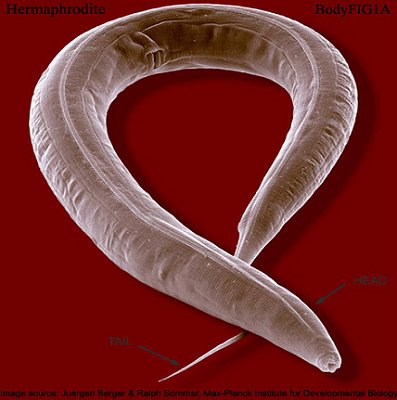news @ nature.com reports that
A group of drugs already approved for humans can prolong the lifespan of worms [Caenorhabditis elegans]. …
[The drugs] lengthened the animals' lives by as much as 50%. Normal signs of ageing were also delayed in the animals.
There is no proof that these drugs will extend lifespan in people. But [Kerry Kornfeld of Washington University in St Louis, Missouri] says it is possible, because the genes and molecules that control the ageing process in worms generally exist in mammals too.
"It has the potential to be a real breakthrough," agrees David Sinclair who studies ageing at Harvard Medical School in Boston. "Fifty years from now people could look back and think that this was a turning point." …
Nobody knows exactly how the anticonvulsants work. The drugs are known to act on the nervous system, but they were developed in the 1950s and their exact mode of action has never been worked out.
But Kornfeld believes that the anti-ageing effects come from altering the nervous system …
In theory, doctors could start prescribing the anticonvulsants tomorrow because they are already approved for human use. But experts say that this would be premature because there could be unknown long-term risks.
Testing the drugs in humans remains difficult. Because the drugs are prescribed mainly to children, there is no suitable human group already taking them that could be studied. If their anti-ageing effects were to be tested in people, doctors would probably have to examine their effect on diseases associated with ageing such as diabetes or Alzheimer's, as it would take many decades for any effects on lifespan to show up.
For now, Kornfeld and his team plan to test the drugs in flies and mice, and to widen their search to other types of chemical. "There may be other goodies in the pharmacy," Kornfeld says.

2 comments:
Which drug is it? I could not find out.
Nice layout, but the CSS does not work right in Opera
Bla s
got it
Here, we report that ethosuximide, trimethadione, and 3,3-diethyl-2-pyrrolidinone increase mean and maximum life-span of Caenorhabditis elegans and delay age-related declines of physiological processes, indicating that these compounds retard the aging process. These compounds, two of which are approved for human use, are anticonvulsants that modulate neural activity.
Post a Comment